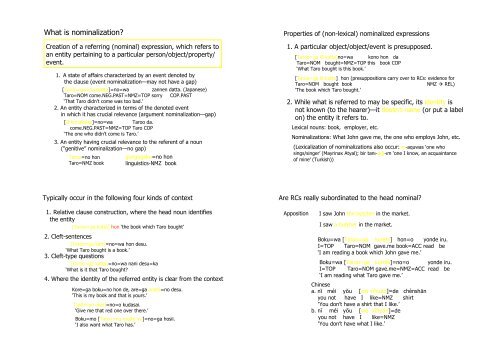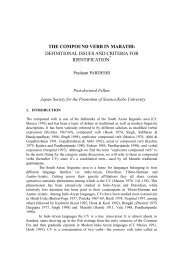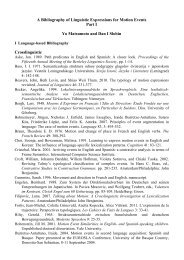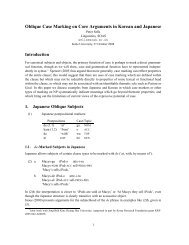Relativization and Nominalization
Relativization and Nominalization
Relativization and Nominalization
Create successful ePaper yourself
Turn your PDF publications into a flip-book with our unique Google optimized e-Paper software.
What is nominalization?<br />
Creation of a referring (nominal) expression, which refers to<br />
an entity pertaining to a particular person/object/property/<br />
event.<br />
1. A state of affairs characterized by an event denoted by<br />
the clause (event nominalization—may not have a gap)<br />
[Taroo=ga konakatta]=no=wa zannen datta. (Japanese)<br />
Taro=NOM come.NEG.PAST=NMZ=TOP sorry COP.PAST<br />
‘That Taro didn’t come was too bad.’<br />
2. An entity characterized in terms of the denoted event<br />
in which it has crucial relevance (argument nominalization—gap)<br />
[Ø konakatta]=no=wa Taroo da.<br />
come.NEG.PAST=NMZ=TOP Taro COP<br />
‘The one who didn’t come is Taro.’<br />
3. An entity having crucial relevance to the referent of a noun<br />
(“genitive” nominalization—no gap)<br />
Taroo=no hon<br />
Taro=NMZ book<br />
gengogaku=no hon<br />
linguistics-NMZ book<br />
Properties of (non-lexical) nominalized expressions<br />
1. A particular object/object/event is presupposed.<br />
[Taroo=ga Ø katta]no=wa kono hon da<br />
Taro=NOM bought=NMZ=TOP this book COP<br />
‘What Taro bought is this book.’<br />
[Taroo=ga Ø katta] hon (presuppositions carry over to RCs: evidence for<br />
Taro=NOM bought book<br />
NMZ ! REL)<br />
‘The book which Taro bought.’<br />
2. While what is referred to may be specific, its identity is<br />
not known (to the hearer)—it doesn’t name (or put a label<br />
on) the entity it refers to.<br />
Lexical nouns: book, employer, etc.<br />
<strong>Nominalization</strong>s: What John gave me, the one who employs John, etc.<br />
(Lexicalization of nominalizations also occur: m-aquwas ‘one who<br />
sings/singer’ (Mayrinax Atyal); bir tanı-dı&-ım ‘one I know, an acquaintance<br />
of mine’ (Turkish))<br />
Typically occur in the following four kinds of context<br />
1. Relative clause construction, where the head noun identifies<br />
the entity<br />
[Taroo=ga katta] hon ‘the book which Taro bought’<br />
2. Cleft-sentences<br />
[Taroo=ga katt]=no=wa hon desu.<br />
‘What Taro bought is a book.’<br />
3. Cleft-type questions<br />
[Taroo=ga katta]=no=wa nani desu=ka<br />
‘What is it that Taro bought?<br />
4. Where the identity of the referred entity is clear from the context<br />
Kore=ga boku=no hon de, are=ga anata=no desu.<br />
‘This is my book <strong>and</strong> that is yours.’<br />
[sotti=no akai]=no=o kudasai.<br />
‘Give me that red one over there.’<br />
Boku=mo [Taroo=no motte iru]=no=ga hosii.<br />
‘I also want what Taro has.’<br />
Are RCs really subordinated to the head nominal?<br />
Apposition<br />
I saw John the butcher in the market.<br />
I saw a butcher in the market.<br />
Boku=wa [Taroo=ga kureta] hon=o yonde iru.<br />
I=TOP Taro=NOM gave.me book=ACC read be<br />
‘I am reading a book which John gave me.’<br />
Boku=wa [Taroo=ga kureta]=no=o yonde iru.<br />
I=TOP Taro=NOM gave.me=NMZ=ACC read be<br />
‘I am reading what Taro gave me.’<br />
Chinese<br />
a. n' méi y(u [w( x'hu)n]=de chènsh)n<br />
you not have I like=NMZ shirt<br />
‘You don’t have a shirt that I like.’<br />
b. n' méi y(u [w( x'hu)n]=de<br />
you not have I like=NMZ<br />
‘You don’t have what I like.’






